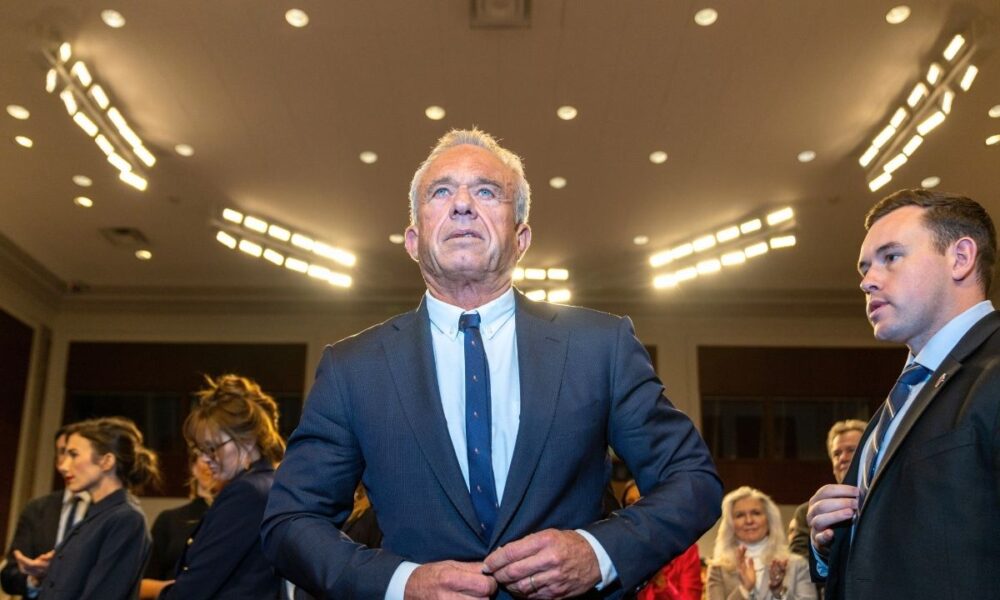A leaked draft of the Make America Healthy Again (MAHA) strategy reveals that Health and Human Services Secretary Robert F. Kennedy Jr.’s commission is advancing an agenda that targets fluoride, opioids, and prescribing practices, but avoids directly addressing lingering controversies surrounding the COVID-19 era.
The draft, obtained and reported on by Politico, includes new sections on microplastics, mental health drug prescribing, and federal oversight of fluoride in water. It also proposes updating OxyContin labeling.
Despite Kennedy’s longstanding prominence as a critic of pandemic policies, the document contains no mention of “mRNA,” “COVID,” “Coronavirus,”“SARS-CoV-2,” “pericarditis,” “myocarditis,” “excess deaths,” or “died suddenly” — issues that have animated many of Kennedy’s closest allies in the MAHA movement.
Instead, the draft devotes space to a new “Vaccine Framework” with bullet points emphasizing “gold-standard science,” ensuring a “best childhood vaccine schedule,” and investigating vaccine injuries. One bullet point in the section remains blank, and the report offers few details beyond the creation of a vaccine injury research program at the National Institutes of Health (NIH) Clinical Center.
The draft also directs the Centers for Disease Control and Prevention (CDC), working with the NIH and U.S. Environmental Protection Agency (EPA), to “update recommendations regarding fluoride in water,” marking one of the most concrete policy shifts in the document.
This apparent persistence follows a dampened victory for anti-fluoride activists. In the fall of 2024, a federal judge ruled that water fluoridation posed an “unreasonable risk” to human health, an order that put legal pressure on the EPA to initiate a process of restricting the level of fluoride in tap water, The Dallas Express reported.
However, Trump’s Solicitor General announced in July that the Department of Justice would appeal the decision.
Some of Kennedy’s allies expressed frustration at the report’s scope. “This report is all hat and no cattle,” Scott Faber, senior vice president of government affairs at the Environmental Working Group, said per Politico. “Consumers want action to get the worst chemicals out of their food and water, not a plan to plan.”
Mary Holland, CEO of Kennedy-founded Children’s Health Defense, warned against giving too much ground to corporate influence. “Granting blanket immunity to corporations who have a fiscal responsibility to their shareholders, and not a responsibility to consumer safety, is one of the most dangerous propositions imaginable,” she said.
Kennedy’s critics within the movement have previously demanded stronger action on mRNA vaccines, with some urging a full ban. A June open letter authored by Dr. Mary Talley Bowden, Naomi Wolf, and others accused Kennedy of “bait and switch” tactics after the U.S. Department of Health and Human Services (HHS) communications softened around vaccine policy.
An HHS spokesperson responded through a statement to The Dallas Express, using the “gold standard science” language and saying that Kennedy was fighting to restore the “doctor-patient relationship.”
The spokesperson added that Kennedy, “has made it clear that vaccine guidance—especially regarding healthy children and pregnant women—must reflect the latest science, individual risk profiles, and uphold the right of informed consent.”
A White House spokesman downplayed the significance of the draft. “Any documents purporting to be the second MAHA Report should be disregarded as speculative literature,” spokesman Kush Desai told Politico.
The draft does address some longstanding activist priorities beyond vaccines. It acknowledges rising concerns about microplastics in consumer products, pledges oversight of psychiatric medications prescribed to children, and calls for an update to “OxyContin labeling to warn patients and consumers about the dangers of chronic use.”
Whether the omissions on COVID-related issues represent a tactical delay or a permanent shift remains unclear. Some allies say the report leaves space for stronger measures later. “Pesticides will certainly still be addressed when the investigation into infertility and the microbiome begins,” said Kelly Ryerson, co-executive director of American Regeneration.


